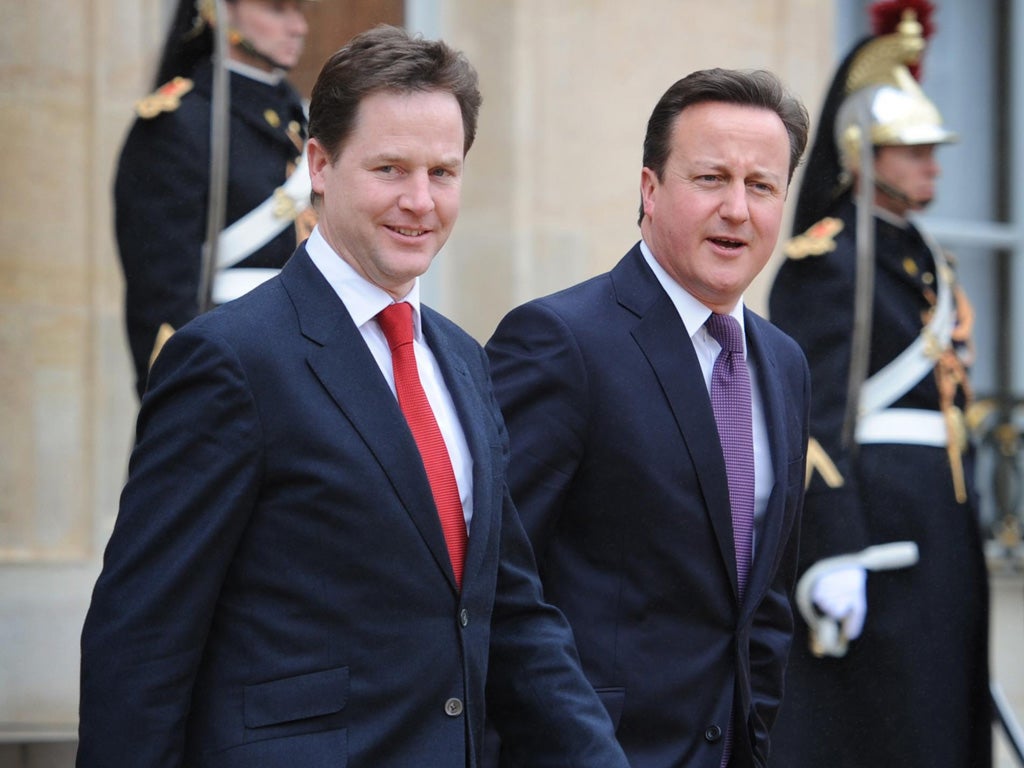Andrew Grice: Behind closed doors, the love-in goes on
Inside Westminster


On a visit to Scotland on Thursday, David Cameron told Conservative activists that passing Gretna Green reminded him of his own shotgun wedding. "Like any marriage there's good times, there's bad times. We – that's Nick and I – we have to work at it like any couple," he quipped. "I didn't expect to end up with a Liberal Democrat, but there we are. You have to make it work."
The Coalition marriage has hit a rough patch – hardly surprising given a torrid four weeks for the Government since what some Tory MPs privately call "the Budget from hell".
They claim "the curse of Clegg" has now infected the Tories as well as his own party, blaming leaky Liberal Democrats for pre-announcing key Budget measures. This left the unpredicted "granny tax" to share the headlines with the cut in the 50p top tax-rate, a toxic mix as it looked like pensioners were funding a tax cut for millionaires.
Liberal Democrat MPs reply that George Osborne has failed to get over the message that his tax cut for the rich will be outweighed by higher taxes on the wealthy.
The most significant change in the past month is that the Tories' popularity is on the slide for the first time since the 2010 election. Yesterday a YouGov survey gave Labour a 13-point lead, putting Labour on 45 per cent and the Tories on 32 per cent. It's what you would expect when a government is taking unpopular decisions. Given the spending cuts, it's surprising that Mr Cameron's party has been relatively unscathed for so long. The Liberal Democrats have taken the bullets. "We have got used to living in a shitstorm; now it's the Tories' turn," said one Liberal Democrat MP.
From recent headlines, you might think the wheels were in danger of coming off the Coalition. When Tory MPs attacked Mr Clegg's plans for an elected House of Lords at a meeting of the 1922 Committee on Thursday, they were also letting off steam about the Liberal Democrats punching above their weight and the frustration of being in coalition. It's no surprise they ache for a majority Tory government, even if some suspect Mr Cameron would prefer a continuing Con-Lib coalition after the next election to a tiny Tory majority leaving him at the mercy of a few hardline Eurosceptics.
Behind closed doors, relationships between senior figures in the coalition parties are much better than the headlines suggest. "It's a much happier place than during the Blair-Brown coalition," said one Downing Street official.
The Liberal Democrat leadership is phlegmatic about the recent squabbles between the coalition parties, diagnosing a routine bout of "pre-electionitis" ahead of the local elections on 3 May. After that, Mr Cameron and Mr Clegg will want to remind voters that the Coalition show is still on the road. Sensibly, they won't try to repeat the lovey-dovey joint press conference in the Downing Street garden after they took their marriage vows in 2010.
Instead, expect them to emphasise their commitment to securing economic growth and the Coalition's core mission to sort out the deficit – on which the Liberal Democrats remain remarkably solid.
After recent disagreements, Mr Cameron and Mr Clegg will also want to use next month's Queen's Speech to highlight the areas where their parties agree. There is a problem: Lords reform could dominate Parliamentary business for the next two years. So they will aim to reassure voters that most of their energy will be devoted to the economy, not an arcane debate about the British constitution.
The two leaders are discovering that coalition is a perpetual balancing act. Where possible, they cut each other some slack when they have a "party problem". But they have to watch their own back too, so as not to get shot by their own troops.
Some Coalition enthusiasts worry that the Liberal Democrats' decision to "differentiate" from the Tories, while the right strategy for Mr Clegg's party, carries big risks for the Government. Now that the trouble-hit Budget has called its competence into question, open divisions between the two parties could raise further doubts.
"A process which starts with modest intentions in a few discrete areas of policy could become contagious and damaging," David Laws, the former Chief Treasury Secretary and still an influential Liberal Democrat player, argued last month. "It is easier and lazier to differentiate in government by saying 'no' to things than by developing a positive policy agenda," he said. "If both parties sought to differentiate just by blocking each other's ideas, we would end up with a policy paralysis that would undermine the Coalition and be very bad for Britain."

Join our commenting forum
Join thought-provoking conversations, follow other Independent readers and see their replies